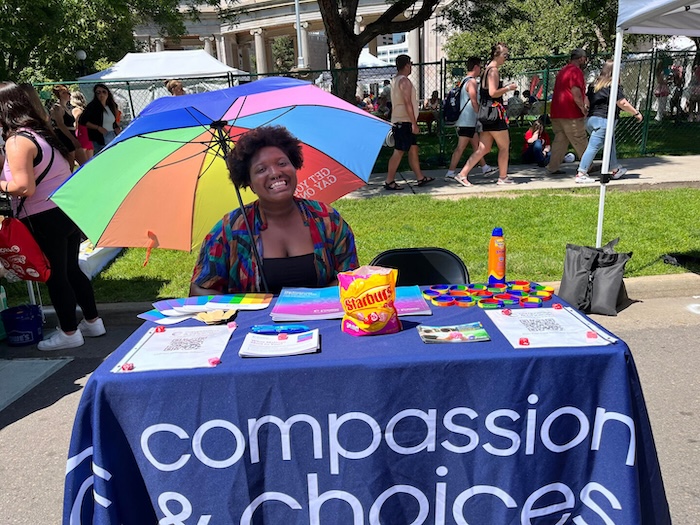— Advocates for Inclusive End-of-Life Options

By Jen Peeples
The journey towards the end of life is an inevitable part of our human experience. However, the circumstances surrounding this transition can be far from equal, particularly for marginalized communities. We had the opportunity to meet with Meagan Williams, a member of the Communications Team for many national campaigns, including in Minnesota. She connected us to the exploration of tireless efforts of organizations like Compassion & Choices, that are dedicated to advocating for expanded end-of-life options through education, outreach, and legislative change.
Williams expressed that their work serves as a beacon of hope for those directly affected by inequities from the system, while also striving to grant patients who request medical in aid death a greater autonomy and respect during their final moments.
Compassion & Choices is a prominent advocate in this space. They are relentlessly working to shed light on disparities in end-of-life care. Understanding that the path towards a compassionate and inclusive approach to end-of-life decisions begins with education and awareness. Through their outreach efforts, they aim to empower individuals and communities-especially those from marginalized backgrounds, by providing information and resources needed to make informed choices. We had the opportunity to sit-down with 4 amazing advocates of Compassion & Care. Their work is an expression of their passion. One to be known today and remembered tomorrow:

Osha Towers (they/them), a key figure in the LGBTQ+ Leadership Council, shared firsthand the shortcomings in LGBTQ+ end-of-life care during the trying times of the COVID-19 pandemic in 2020. Towers emphasized that there is deep discrimination that often arises from a profound lack of understanding and empathy– leading to distressing challenges such as misgendering, legal vulnerabilities, and the denial of chosen families.
When asked the purpose of their passion in this field, they shared, “I lost many loved ones throughout my community. Working within Black and brown LGBTQ+ healthcare– Yet advocacy work within end-of-life care specifically rose for me within the LGBTQ+ community when my coworker lost their long-time partner. Although this was someone, they had spent years caring for, their partner’s family did not honor their relationship or the queer life this person lived. So, they swooped in, took over, booted any level of queer community from the process, and buried them outside of reflecting on their whole identity.”
The fire behind the Council’s mission centers on priorities like inclusion by meeting the unique needs of LGBTQ+ individuals while driving institutional change. By engaging with diverse LGBTQ+ groups across the nation, Towers has developed a shared understanding of the importance of medical aid in dying, shaped by the community’s collective losses during the AIDS epidemic.
Now, the medical in aid dying has not always been accepted or approved by certain communities. However, a different intention and meaning was brought the platform by Dr. Joanne Roberts, a terminally ill physician, also initially held reservations about medical aid in dying laws. However, her personal journey and convictions have led her to recognize that such legislation can provide relief and rested assurance to suffering patients.

Dr. Roberts has a compelling mission to humanize this issue through the power of storytelling, emphasizing that death transcends political divides and dispels concerns about the misuse of aid-in-dying by citing data from states with extensive experience in its implementation. To hesitant lawmakers, Dr. Roberts gently reminds them that this is an individual choice, and no clinician should feel compelled to participate if it violates their moral principles.
Along with Dr. Roberts fight to appeal to legislation, Dr. Rebecca Thoman oversees legislative advocacy for Compassion & Choices in Minnesota and has been tirelessly working to advance the proposed End-of-Life Options Act. Though it faced setbacks in 2022, Dr. Thoman remains hopeful that it could see action in 2024.
Recognizing the importance of countering misinformation and creating a sense of urgency around the topic of death through peer testimonies, Dr. Thoman faithfully educates and leads other physicians on the infrequent use and strict oversight of aid-in-dying. This is all while respecting individual doctors’ moral right to opt out. Dr. Thoman understands that for lawmakers, bridging the gap between hypothetical concerns, the realities of clinical practice, and personal stories are keys to garnering their unrelentless support. If the legislation passes, Dr. Thoman believes it will bring solace through expanded end-of-life options for countless diverse individuals.
While also on the legislature end, we have attorney Phil Duran. Duran is known for his advocacy in LGBTQ+ rights in the approaches of medical aid in dying work with a unique perspective. He understands that arranging the plans one’s medical aid in death can offer a sense of peace; a sentiment shared by same-sex couples who were once denied the right to marry.

Through his work with Rainbow Health, Duran is actively expanding culturally competent care access for LGBTQ+ and aging communities through provider education and patient empowerment. He acknowledges that privilege often plays a role in determining the level of agency one has in making end-of-life decisions. Duran believes that by countering religious opposition and amplifying diverse stories, we can broaden the movement for compassionate end-of-life options.
While each advocate featured in this article brings their own expertise and experiences to the table, there are common threads that unite them in their pursuit of a more compassionate and equitable approach to end-of-life choices. Education, empowerment, and equity are at the heart of their endeavors. Despite their diverse backgrounds, they all share a profound understanding of the value of having options and autonomy when it comes to one’s own passing. Through their steadfast commitment to amplifying diverse voices and stories, driving policy changes, and expanding societal mindsets – these advocates serve as inspiring examples of the passion that fuels a movement toward greater compassion and care at life’s transitioning end.
Complete Article ↪HERE↩!
